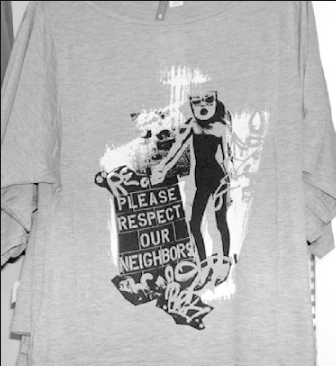By Julie Shapiro
Designers for the international clothing chain H & M must be hanging out in bars on the Lower East Side. That’s the only explanation resident Rebecca Moore can concoct for the T-shirts she recently found at H & M, which read: “Please Respect Our Neighbors.”
Moore has seen more and more signs with that message in bar windows over the last five years.
“As the bars exploded, the signs became more ubiquitous,” she said.
However, the proliferation of signs was not accompanied by an increase in respect, Moore said. Rather, noise from the bars keeps her up late into the night.
“It’s really hard to live in a place that’s being turned into Times Square,” Moore said. “It’s not like we’re being totally unreasonable in wanting to go to bed by 3 a.m.”
Moore bought one of the “Respect” T-shirts, which depict a figure standing next to the central message, graffiti scrawled around the edges. She hasn’t yet worn the shirt — she’s saving that for the next Community Board 3 State Liquor Authority Committee meeting.
“I’m hoping [wearing the shirt] will spread sensitivity,” Moore said. “That’s my naive hope, but I’m ever-optimistic.”
Moore, a musician, is a longtime resident of Stanton St. on the Lower East Side. She founded the Ludlow-Orchard Community Organization, an online hub that spreads the word on local bars and neighborhood gentrification.
Moore has not seen many “Please Respect Our Neighbors” signs outside of New York. In Europe, cities tend to have designated red-light districts, unlike the residential Lower East Side, Moore said. Now, though, high rents are forcing small businesses like laundromats out in favor of upscale bars and restaurants.
“I am not for or against the shirt, because it will change meanings depending on who is wearing it and within what context,” said Moore, who anticipates that bar-hoppers will wear the shirts ironically. “I would like to think that even if some people wore it mockingly, somehow the message would still be getting more ingrained into people.”
H & M did not return a call for comment on the origin of the message and design, which is also sold printed on a large cotton bag.
Satisfied with her T-shirt purchase, Moore said she is “marveling at how a problem like bar proliferation can make it into worldwide fashion.”






































